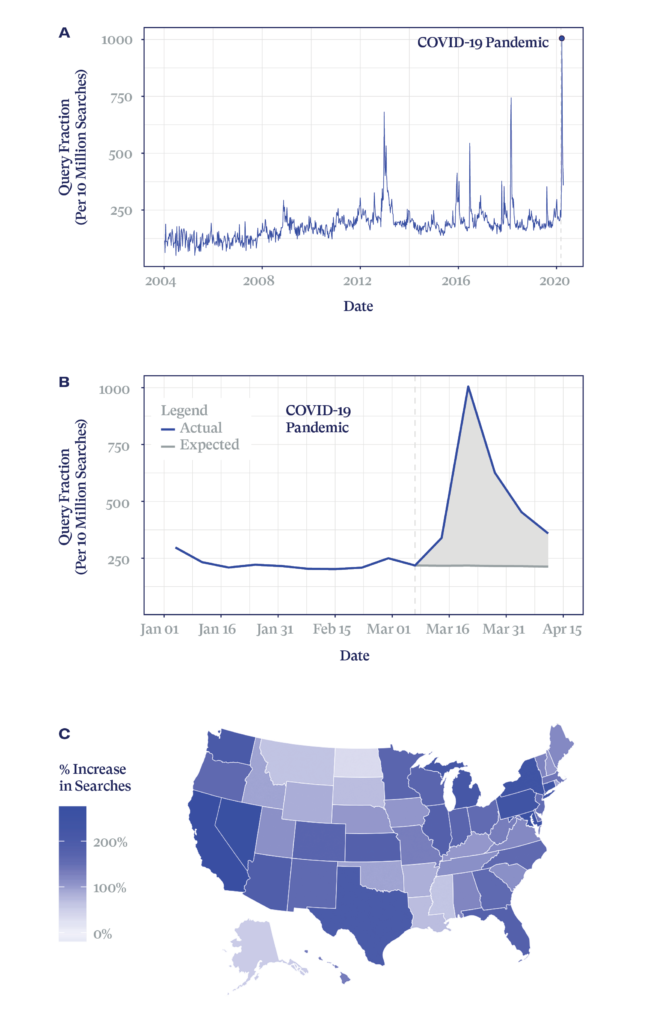What Search Data Shows About Americans and Guns During the COVID-19 Crisis

Introduction
With millions of Americans staying at home across the country during a crisis of intense emotional and economic stress, gun safety advocates have raised concerns about increased risks of unintentional shootings, domestic violence shootings, gun suicides, and city gun violence. Unprecedented spikes in background checks, meanwhile, reflect a dramatic increase in gun purchasing that compounds these risks.
Federal background check data, however, fails to capture the full spectrum of ways that people acquire guns, as well as the number of people who are removing guns from gun lockers or other storage. In an effort to cast additional light on issues of firearm access during this stage of the COVID-19 crisis, we used real-time Google search data to gauge interest in buying and cleaning guns across the country.
Methods
We extracted weekly data on all United States Google searches (including state-level data) related to gun preparation—those that contain the terms “buy gun(s)” or “clean gun(s)” (e.g., “how to clean gun” or “where to buy guns”), executed between January 4, 2004, and April 11, 2020, from the Google Trends Application Programming Interface (API). The API reports these data as “query fractions”—the fraction of all Google searches that include the focal terms—thereby accounting for differences in overall Google usage over time and across locations. These terms were selected because a previous study found that search volumes using these exact search terms significantly predict both gun purchases and firearm injuries/deaths. 1P. B. Levine and R. McKnight, “Firearms and Accidental Deaths: Evidence from the Aftermath of the Sandy Hook School Shooting,” Science 358, no. 6368 (December 8, 2017): 1324–28, doi:10.1126/science.aan8179.
We first describe trends in US gun preparation searches. We extrapolate query fractions to raw count estimates using publicly available data from Comscore. Next, we fit an Autoregressive Integrated Moving Average (ARIMA) model using the Hyndman-Khandakar algorithm 2R. J. Hyndman and Y. Khandakar, “Automatic Time Series Forecasting: The Forecast Package for R,” Journal of Statistical Software 27, no. 3 (2008): doi:10.18637/jss.v027.i03. over all US query fraction values up until March 7, 2020. We chose this cutoff because President Trump declared COVID-19 a national emergency on March 13, 2020, which is included in the following week’s data. We forecast query fraction values for the US from March 8, 2020, to April 11, 2020, and report the difference between the actual and forecasted values. Finally, we calculate the percentage change ([after–before] / before*100%) in mean query fractions before and after the onset of the pandemic (using January 1, 2020, to March 7, 2020, as the pre-period) for each state with bootstrapped confidence intervals.
Analyses were conducted in R ver. 3.6.3 (R Foundation) with an alpha of 0.05.
Results
By March 21, approximately 1,000 of every 10 million Google searches were related to gun preparation, that is purchasing or cleaning (Figure 1). For reference, this query fraction is 35% and 48% greater than the spikes occurring after the mass shootings in Sandy Hook, Connecticut, and Parkland, Florida, respectively. The fraction of Google searches related to gun preparation significantly (p < 0.05) exceeded the ARIMA-forecasted values for each week since President Trump declared a national emergency. Approximately 2.1 million gun preparation searches were executed between March 8 and April 11, which is 158% (95% CI 73–270) greater than would be expected if not for COVID-19. Using this same methodology, forty-nine states (all except Alaska) and the District of Columbia experienced an increase in gun preparation searches.
Discussion
Public interest in gun preparation has reached unprecedented levels amid the COVID-19 pandemic, with approximately 40% more searches for both “buy gun” and/or “clean gun” than the spikes that occurred after the Sandy Hook and Parkland mass shootings.
This study has limitations. We only observe the volume of Google searches related to gun preparation, not the motivation for each search. However, as mentioned above, a 2019 study using Google search data found that search volumes using these exact search terms significantly predict both gun purchases and firearm injuries/deaths.
This surge in interest has the potential to compound the health risks of the COVID-19 pandemic.
Figure 1. Google Searches for Gun Preparation and the COVID-19 Pandemic

Note: Panel A shows the fraction of Google search queries that relate to gun preparation between January 1, 2004, the first date for which data is available, and April 11, 2020. The blue line is the actual fraction of Google searches. The dotted vertical line is placed at March 7, 2020, denoting the breakpoint between the pre-period and the post-period, chosen based upon when President Trump declared COVID-19 a national emergency. Panel B shows the fraction of Google search queries that relate to gun preparation between January 1, 2020, and April 11, 2020. The dark blue line is the actual fraction of Google searches. The light blue line represents the expected fraction of Google searches based upon an Autoregressive Integrated Moving Average (ARIMA) model fitted over data from January 1, 2004 to March 7, 2020. The dotted vertical line is placed at March 7, 2020. The shaded area represents excess searches, i.e., searches in excess of what the ARIMA model forecasted. Panel C shows the percentage change in the query fractions for each state for a pre-period between January 1, 2020, and March 7, 2020, and the period between March 8, 2020, and April 11, 2020.
Learn More:
Everytown Research & Policy is a program of Everytown for Gun Safety Support Fund, an independent, non-partisan organization dedicated to understanding and reducing gun violence. Everytown Research & Policy works to do so by conducting methodologically rigorous research, supporting evidence-based policies, and communicating this knowledge to the American public.


